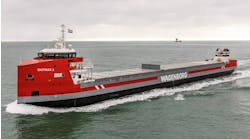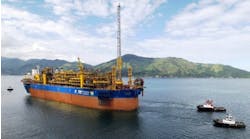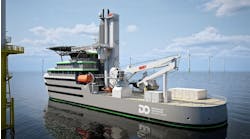It probably comes as no surprise that businesses both large and small that serve the Gulf of Mexico offshore drilling and production industry have been seriously affected under an 11-month pause by the federal government in issuing deepwater and ultra-deepwater exploration drilling permits.
One thing is certain, however: Most of those same businesses, though increasingly alarmed by the growing downturn in their deepwater drilling market share, aren’t sitting around in sack cloth and ashes. Some are looking for ways to accentuate certain segments of what they do, while others are considering diversification, even taking their business overseas.
Here are a few examples of such companies, all of whom carry out operations in just Lafourche Parish and in the Port Fourchon area.
B&J Martin, Inc.
Galliano
Jimmie “Beau” Martin Jr., sales manager of his family owned company, which specializes in post-decommissioning seabed debris removal, is expanding that service to the North Sea area. In fact, he’s already met with several U.K. offshore vessel companies interested in licensing his company’s patented seafloor cleaning net technology.
“We’re starting out as an abandonment consultant there,” Martin explained. “Many of the 4-pile and 8-pile fixed platforms installed in the southern North Sea off England in the 1970s have finally reached the end of their useful lives, and removing them to shore as salvage is starting to gain momentum. Once they are gone, the stakeholder companies will need our netting technology and experience to clean up the leftover seabed debris around the platform sites, as ordered by U.K. regulators.”
He said Martin vessels – built very much like open-sea shrimp trawlers, the construction of which was the company’s initial business when it opened its doors in 1942 – may be moved to the North Sea or new vessels may be built in the U.K. He noted that personnel from several U.K. vessel companies already have been trained in using the debris recovery gear.
“Since 1990, when we developed our special debris recovery net, we’ve done 1,000 of the 1,800 or so platform site clearances performed so far in Gulf, and have picked up debris in up to 450 ft of water,” said Martin.
What kind of debris? Just about anything installed on a fixed structure, he said.
“The most often reclaimed debris includes pieces of steel grating, boat landing platforms, stairs wells, wire rope, broken pipe and lots of shrimp netting that fowled on it through the years. But we’ve also picked up tools, equipment skids and occasionally, washers and dryers. One time we even picked up a proverbial kitchen sink.”
Halo Wire Rope
Port Fourchon
Kenneth Ragusa, principal owner of Halo and related subsidiaries that supply the marine industries with wire rope slings, tow lines, chain slings, hoists and blocks and other rigging hardware, is ramping up the company’s use of Radio Frequency Identification (RFID) technology to bring total traceability to all equipment it fabricates in its Port Fourchon and other locations in the state.
The technology behind RFID provides a safety compliance solution that utilizes a combination of software, handheld devices and the Internet to automate inspection and safety compliance management.
Ragusa says rigging hardware, safety anchor shackles and mooring sockets are now being fitted during manufacturing with individually serialized electronic RFID tags that contain stored data covering the piece of equipment itself, which helps to solve many of the inventorying and tracing problems encountered when in large inventories of similar equipment are kept. A hand-held reader, merely pointed at the equipment, transmits power to the tags for instantaneous data retrieval and recording to the reader’s hard drive. This then can be exported to a main computer data base and/or sent electronically via the Internet.
“The RFID system eliminates inspection and audit paperwork, gives personnel the ability to conduct inspections and audits faster and more securely, and gives management real-time visibility into safety,” said Ragusa.
VIH Cougar Helicopters, Inc.
Galliano
A relative newcomer to the Lafourche area, VIH Cougar furnishes a number of fast, long-range helicopter aircraft for use in personnel transfer and other special air services to the Gulf deepwater drilling industry.
Larry Lippert, director of operations, says the company brings “North Sea” flight standards to the Gulf that stress both safety and security by routing its entire operation through its new $10 million, ultra-modern passenger facility and hanger, completed in March 2010, at the South Lafourche Leonard Miller Jr. Airport in Galliano.
VHI Cougar plans to have two VH-139 helicopters based at the South Lafourche Leonard Miller Jr. Airport at Galliano, Louisiana.
Currently, they operate one 19-passenger Sikorsky S-92 helicopter for passenger transport. The giant S-92 can, however, be converted quickly for an emergency medical services (EMS) configuration.
The company also fields a smaller VH-139 helicopter fully equipped for EMS missions for companies who are contract members of a VIH Cougar cooperative effort. Members of the co-op include oil producers and both drilling and construction companies, all of whom operate in far-flung deepwater areas of the Gulf. The medical services currently are provided by the Acadian Companies, a highly respected EMS service provider located across the Gulf Coast from Texas to Mississippi. VIH Cougar provides continuity of care from the medic on the platform to the doctor in the emergency room, all under Acadian Cos. control.
Bollinger Shipyards, Inc.
Lockport
A privately owned shipbuilding company established in 1946, Bollinger is a leader in providing new vessel construction and marine repair and conversion services, specializing in a wide variety of small to medium-sized offshore and inland vessels used by the energy, commercial and government marine markets in the U.S. Gulf region.
According to Robert R. Socha, executive vice president of sales, in addition to a current contract to build four heavy duty tugboats, Bollinger has managed to keep its 12 shipyards in Louisiana and Texas busy with vessel and barge repair projects, as well as with an ongoing program of replacement by the U.S. Coast Guard of its 110-ft patrol vessels with a faster, 87-ft long range vessel, most of which will be built at Bollinger yards. The company is building several military patrol vessels for overseas governments, as well.
But that’s not all. Thanks to the company’s ownership of numerous dry docks with capacities ranging from 100 tons to 10,000 tons at various shipyards, Bollinger also is big enough to be currently building three “sludge ships” for the City of New York, a large river barge in three sections, and expanding a floating casino vessel.
But despite a significant decline in overall utilization of Bollinger’s core business, Socha is optimistic about the future, particularly that of its full-service shipyard at Port Fourchon, where its vessel support capacity was expanded recently with addition of a 1,800-ton dry dock that is suitable for servicing vessels in the 100-ft to 180-ft range.
Offshore Articles Archives
View Oil and Gas Articles on PennEnergy.com





